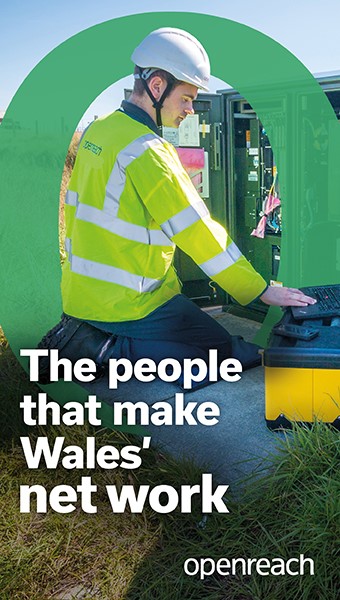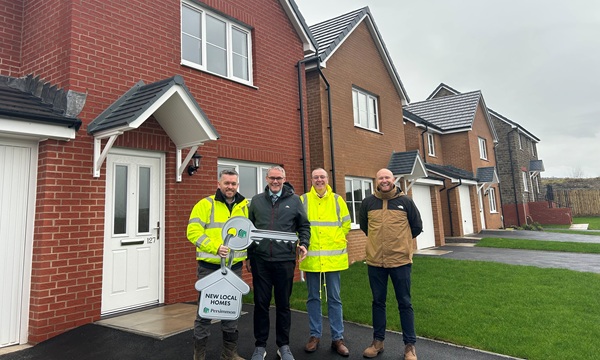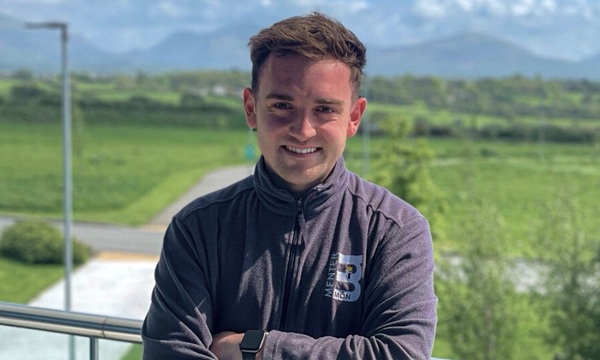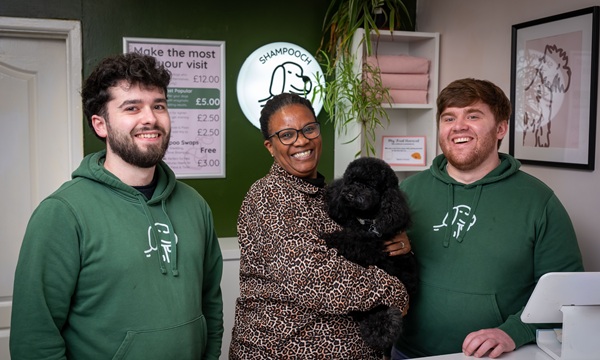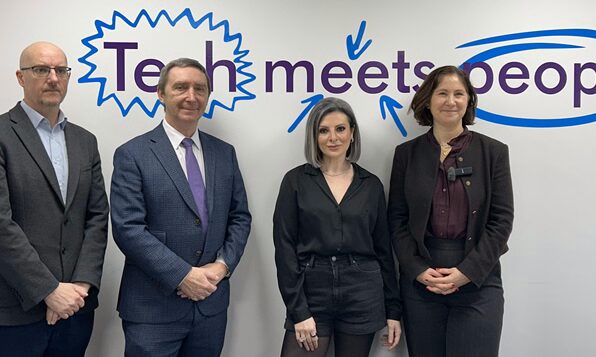How did we bring business, education and government around the same skills table at Cardiff Capital Region? How is collaboration and co-production driving our pioneering Employment & Skills plan? And what do the skills needed for the green economy look like?
The Venture ‘Talent Leaders Talking’ series gets to the very heart of where we stand in terms of the skillsets, employability, opportunities and potential we have in our region – and in this kick-off feature, we talk to Leigh Hughes, Chair of the CCR Skills Partnership, about ‘where we are’ and ‘where we are going’ ….
“When we established the Cardiff Capital Region Skills Partnership (CCRSP), our vision was to promote strategic and collaborative decision-making at a critical time for the skillsbase of our region. Bringing together thinkers and doers from business, education and training to share knowledge, understand ‘where we are’ and identify ‘where we need to go’ has given us a clear direction – and despite the challenges of the pandemic, I’m delighted to say that we’re ‘on target’ in achieving our goals and objectives.
“As a strategic body, we also analyse and produce key Labour Market Intelligence (LMI) aligned to economic data. As we put our 2019-22 Employment & Skills plan into action, we developed a mechanism to review regional skills provision and advise Welsh Government on future prioritisation – which in effect means maximising future available funds and stimulating innovation.
“That plan has proven successful because it was developed in close cooperation with business, education and Welsh Government – bringing together the key strands of the policies set out in Prosperity for All, the Employability Delivery Plan, Apprenticeships Skills Policy Plan and The Wellbeing of Future Generations (Wales) Act.
“Fusing those forces for good has given us a strong foundation to move forward. It’s allowed us to do many new things – including informing Welsh Government’s Covid-19 pathway to recovery through impact reports based on first-hand engagement with employers, through the so-called soft intelligence that’s vital to understanding many different realities – and we’re now developing a new three-year Employment & Skills Plan that reflects the spirit of co-construction that has become a hallmark of all that we do.
Communication and collaboration are driving our ambition and achievement
“Our remit to ‘do’ gives us a platform to shape and drive change – and we’re greatly encouraged by both the milestones being posted and the wider effect being achieved through conversations and actions that simply wouldn’t have happened a few years ago. That’s why the next year or so is particularly important for skills in our region and Wales as a whole. Right now, policies are being developed and practices are being put in place that will shape employability in CCR for the decade to come.
“We’re living in a time of ongoing change and that means we can all become a bit blasé about ‘what’s next’ – but there are key developments happening that we simply must embrace, as they offer perhaps a once-in-a-generation opportunity to build the talent pipelines we need and the wider inclusive prosperity that we want.
“Genuine dialogue has been at the heart of our progress to date; with clarity from the Welsh Government on the part we can play in the new Programme for Government 2021-26. There are certainly exciting plans on the horizon – not least in the ‘Stronger, fairer, greener Wales: a plan for employability and skills’ that was recently launched, scoping actions that are being taken through the Senedd, all designed to leave a positive legacy for future generations to come.
Our evidence-based approach to Apprenticeships is bearing fruit
“Some of the innovations already in place can help us change our game significantly – particularly the Welsh Government’s ambition to create 125,000 all-age apprenticeships in this Assembly term – widening the apprenticeship funnel to many more people and broadening the offer at higher degree level.
“The CCRSP is fully supportive of this – and we use our own evidence-base to influence apprenticeship developments, working with education and training providers to articulate the undoubted employer demand for programmes across the CCR priority sectors. That’s added a whole new dynamic, especially since the Degree Apprenticeship Programme was launched in Wales in 2018 – offering a strong work-based alternative to ‘traditional’ university higher education, blending learning on the job with part-time study.
“Gaining that real-world experience in a chosen career path while getting paid at the same time opens up a whole new dimension to individuals, employers – and the education providers – so it's been exciting over the last few months for the CCRSP to work with HE institutions to map the regional Degree Apprenticeship offer. For employers, we’ve discovered that the degree apprenticeships provide an affordable option for recruiting and upskilling employees – designed around the immediate needs of those employers as well as empowering the workforce with the skills they need, now and in the future.
Joined-up thinking on the jobs and skills for a green tomorrow
“That ethos of co-production has also driven CCRSP’s collaboration with other Regional Skills Partnerships – especially around identifying the jobs and delivering the skills that will drive transition to a green economy. To that end, all four regional skills partnerships in Wales have commissioned Data Cymru to lead a research project that will identify the emerging green jobs and assess the associated skills gaps.
“The research is deliberately broad in nature at the moment but could pave the way for a future ‘deep dive’ – and it’s already revealed a wide range of challenges surrounding the skills needed for the green revolution. Those challenges include an inconsistency in the definitions, scope and priorities being reported – as well as disconnects between Government and private sectors. The fact that it’s a constantly changing picture, with outdated Standard Industrial Classifications and Standard Occupational Classifications, also present difficulties when looking to report essential labour market intelligence.
“But that intelligence is already invaluable, suggesting that there are around 6,000 businesses and 9,700 jobs across the low carbon and renewable energy sector in Wales – and painting a picture of green jobs covering both the transformation of existing jobs into new roles, as well as brand new jobs that previously didn’t exist. The research tells us that Construction, Manufacturing and Transport account for 73% of the jobs that need reskilling, so it’s great to see that the CITB have already identified the skills demands associated with retrofit.
“A picture is emerging and will continue to evolve – with current findings suggesting that by 2028 Wales will need an additional 2500 Construction Project Managers, 2,800 Plumbers and HVAC Trades, around 900 Building Envelope Specialists and 1,400 labourers. We’re working to put in place the skills for those jobs, supporting the delivery of courses and qualifications right across the green skills agenda.
A new 3-year Employment & Skills Plan from Autumn 2022
“Looking forward, I’m hugely excited about everything that is possible with the launch of our new regional 3-year Employment & Skills Plan in Autumn 2022. Communication and engagement of that plan will be as critical as ever, which is why we’re hosting an event to kickstart discussions with employers, stakeholders and providers of post-16 education and training – helping identify the skills-related challenges that need to be addressed.
“It’s also an opportunity for us to promote the Young Person’s Guarantee to key stakeholders across Southeast Wales, being a champion and catalyst for that all-important collaboration across the region. It’s part of our ongoing mission to better understand the regional landscape, to scope the current employment, education, training, skills and wellbeing initiatives being undertaken – helping make them as purposeful as possible, all geared to giving the people of our region the employment and life chances they deserve.”
Thank you, Leigh, for such thought provoking views and fascinating insights into the valuable work of CCR Regional Skills Partnership. Look out for our further Talent Leaders Talking features from key figures in our region – and to find out more about the latest in Skills & Talent in Southeast Wales, go to: www.venturewales.org




